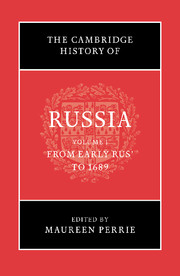Book contents
- Frontmatter
- 1 Introduction
- 2 Russia’s geographical environment
- Part I Early Rus’ and the Rise of Muscovy (c. 900–1462)
- 3 The origins of Rus’ (c.900–1015)
- 4 Kievan Rus’ (1015–1125)
- 5 The Rus’ principalities (1125–1246)
- 6 North-eastern Russia and the Golden Horde (1246–1359)
- 7 The emergence of Moscow (1359–1462)
- 8 Medieval Novgorod
- Part II The Expansion, Consolidation and Crisis of Muscovy (1462–1613)
- Part III Russia Under the First Romanovs (1613–1689)
- Bibliography
- Index
- Plate section"
- Plate section"
- References
7 - The emergence of Moscow (1359–1462)
from Part I - Early Rus’ and the Rise of Muscovy (c. 900–1462)
Published online by Cambridge University Press: 28 March 2008
- Frontmatter
- 1 Introduction
- 2 Russia’s geographical environment
- Part I Early Rus’ and the Rise of Muscovy (c. 900–1462)
- 3 The origins of Rus’ (c.900–1015)
- 4 Kievan Rus’ (1015–1125)
- 5 The Rus’ principalities (1125–1246)
- 6 North-eastern Russia and the Golden Horde (1246–1359)
- 7 The emergence of Moscow (1359–1462)
- 8 Medieval Novgorod
- Part II The Expansion, Consolidation and Crisis of Muscovy (1462–1613)
- Part III Russia Under the First Romanovs (1613–1689)
- Bibliography
- Index
- Plate section"
- Plate section"
- References
Summary
During the century following the Mongol invasion and subjugation of the Russian lands to the Golden Horde the princes of Moscow, the Daniilovichi, gained prominence in north-eastern Russia. By winning the favour of the khans of the Golden Horde they were able to break dynastic traditions of seniority and succession and become the grand princes of Vladimir. But the Daniilovich princes lacked the full support of other branches of the dynasty in northeastern Russia, whose members recalled traditional norms of legitimacy, and of the Church, whose hierarchs were preoccupied with securing the unity of the metropolitanate of Kiev and all Rus’. They were, therefore, dependent upon the continuing goodwill of the Golden Horde khans to maintain their position. But in 1359, Khan Berdibek (r. 1357–9)was overthrown and the Golden Horde entered a twenty-year period of civil war. The foundation upon which Daniilovich authority rested was destabilised.
The Daniilovich princes did not, however, lose their grip on the throne of Vladimir. Nor, despite the decline of the Golden Horde and sharp clashes with it, did they renounce their allegiance to the khan or lead north-eastern Russia to independence from Tatar hegemony. On the contrary, the northern Russian princes, including the Daniilovichi, continued, albeit with greater reluctance and less frequency, to travel to the horde to receive their patents for office and to pay tribute to the khan. It was not north-eastern Russia, led by the princes of Moscow, that was emerging as the state prepared to replace the disintegrating horde as the dominant polity in Eastern Europe.
- Type
- Chapter
- Information
- The Cambridge History of Russia , pp. 158 - 187Publisher: Cambridge University PressPrint publication year: 2006
References
- 1
- Cited by

